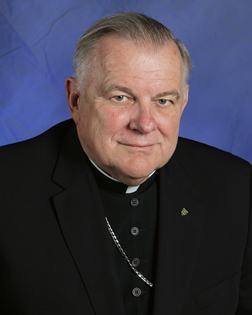
'Faith of our fathers' - and ours?
Monday, October 11, 2010
*Archbishop Thomas Wenski
“Faith of our fathers, living still, in spite of dungeon, fire and sword…” This hymn based on Hebrews 11:1-2 is still sung in our churches and is a paean to the survival of Christianity in spite of the persecutions which have sought to suppress it since the time of the Roman emperors. The Catholic faith did not drown in the blood of its martyrs; rather, on the contrary, it grew stronger both in its intensity as well as its reach. The refrain of the song, “Faith of our fathers, holy faith, we will be true to thee till death,” when on the lips of the saints, was no idle boast.
However, while many today may join in singing this refrain, their commitment to their Catholic faith is much more tentative. Many shaped by their experience in the consumer society in which we live are, as some have characterized them, “Cafeteria Catholics” – they think that they are free to pick and choose what tenets of their faith they will uphold and indeed practice. Also a recent Pew study – which sampled a significant number of Catholics as to their faith knowledge – found a disturbing plurality of Catholics “religiously illiterate”; that is, they do not know, understand or care to understand what they, as professing Catholics, are supposed to believe.
Earlier Pew studies have also documented the number of Catholics who have drifted away from the Church – some towards evangelical sects and others to the soft apostasy of the increasingly dominant secularized culture which holds religious belief to be a matter of indifference. In fact, inactive Catholics – those whom we used to call “fallen away” – were they their own denomination, would be the largest religious group in the United States today. Yet, would most of these people have left the Church if they truly understood what it is we really believe as Catholics?
Some of the blame could be laid at the feet of the failed catechesis of two generations of Catholics who came of age during the confusion that beset much of the Church in the aftermath of the Second Vatican Council. The more didactic program of learning the catechism by rote was replaced by a more “experiential” thrust. Children learned that Jesus loved them but they couldn’t name the Ten Commandments or the seven sacraments.
However, the intuition of the proponents of “experiential catechesis” was not all misplaced. Pope Benedict XVI himself insists that Christianity is not primarily belief in a series of propositions or ideas but springs from the encounter with a person, Jesus Christ. Nevertheless, one’s encounter with Christ, if authentic, cannot be just a creation of one’s own subjectivity: one must also encounter the “content of revelation” found in Scriptures and mediated through the Church in order to experience Christ as he really is.
In the 1990s, the Church produced in the Catechism of the Catholic Church, a synthesis of the teachings of Vatican II that was also in continuity with “the faith of our Fathers”. This universal catechism serves as a ready reference for both the believer as well as the seeker who wishes to know Jesus and what he, in turn, demands of us if we accept his invitation to enter into friendship with him.
Our fathers kept the faith – in spite of the persecutions they faced; our fathers passed on the faith to us – often overcoming many obstacles to do so. A careful study of the four “pillars” of the Catechism of the Catholic Church — the creed, the sacraments, the life of faith, and the prayer of the believer — can help equip a Catholic today, in the words of the Apostle, to “give an explanation to anyone who asks you for a reason for your hope…” (1 Peter 3: 15)
Our fathers kept the faith – in spite of the persecutions they faced; our fathers passed on the faith to us – often overcoming many obstacles to do so. By becoming more “religiously literate” we will be better able to keep the faith and to pass it on as well.
“Faith of our fathers, we will strive
to win all nations unto thee;
And through the truth that comes from God,
We all shall then be truly free.”


Comments from readers
Confronted with that serious matter, some in our midst may say this is a consequence of the Vatican Council II. The problem is not what the Council said but what many of us think was said and changed by the Council. I still remember some of the problems caused by the Dutch Catechism of 1966, indicating that regarding the several methods of regulating births there was nothing said in concrete about this methods by the Council and consequently, they [the bishops] could "sense a clear development in the Church, a development, which is also going on outside the Church" (A New Catechism, 402). However, the Council in its constitution Gaudium et spes, clearly states that the members "of the Church may not undertake methods of birth control which are found blameworthy by the teaching authority of the Church in its unfolding of the divine law" (GS 50).
Unfortunately, this attitude toward not accepting the faith taught by the Church as a whole, is not limited just to sexual matters, we find it in many other areas such as social justice, capital punishment, war, euthanasia, liturgical practices, etc. As the Archbishop well indicates we have an excellent guide for our lives as Catholics in the Catechism of the Catholic Church; however, I would dare to add, that we need also to read again the documents of the Vatican Council II to understand and realize what was really said on the final documents prepared by the Council Fathers, approved by Pope Paul VI and wholeheartedly supported by all his successors.
I find very significant and providential that Archbishop Wenski signed this week contribution on Monday, October 11, 2010… the day we were celebrating the 48th anniversary of the opening of the Vatican Council II by Pope John XXIII.
It saddens me to see families define themselves in terms of their accomplishments, their neighborhoods, economic status and political affiliations. None of these things really give man a sense of who he is in relation to God and neighbor. All it says is what he has accomplished in comparison to others. Too often, Catholic's based their identity on achievements rather than the Christian ideal.
Tonight, after reading this article, I had a long conversation with a young man who asked me, "Brother, how do I fulfill God's will in my life?" I responded with something that I learned as a child. "Give him permission to take what he wants and welcome what he gives." Obedience and submission to Divine Providence was a key component in the faith of our fathers.
Thank you Excellency for helping me remember the most important lesson that my fathers handed down to me.
As a CCD teacher it saddens me to see our children having very little knowledge regarding the gifts of the Catholic Church and Her teachings. I believe this disservice to our children lies at the feet of all Catholics, religious and laity alike. Your words give me great hope the pervasive "Cafeteria Catholicism" can and will be reversed. God bless you!